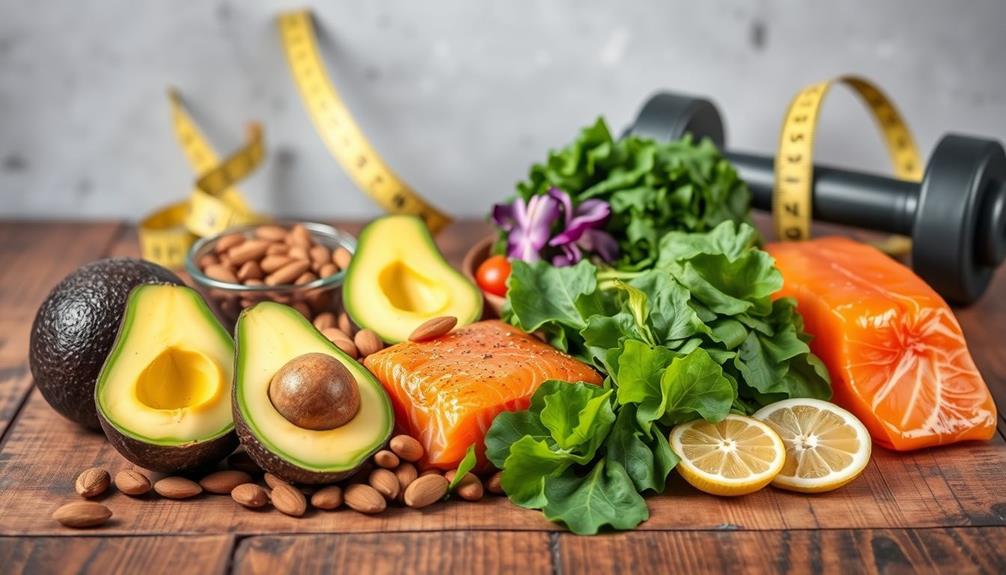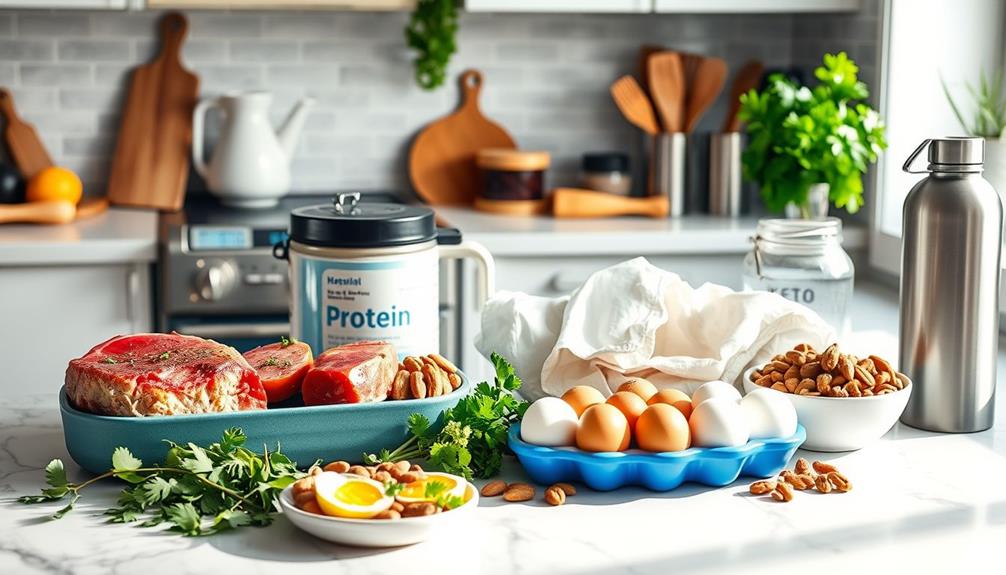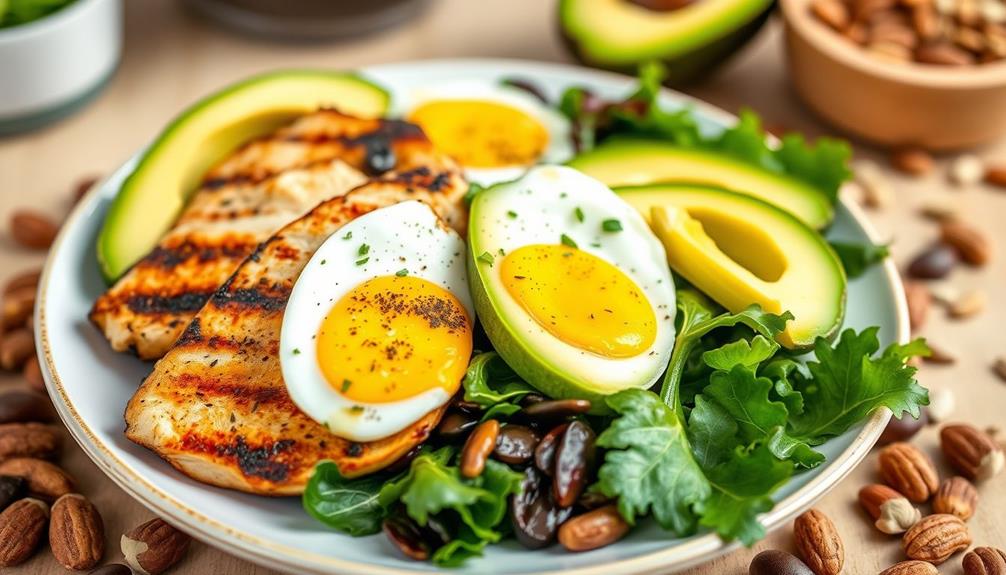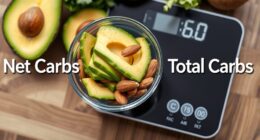You can definitely build muscle on a keto diet by focusing on your protein intake and caloric surplus. Aim for 0.7 to 1 gram of protein per pound of body weight while keeping your carbs under 50 grams to maintain ketosis. Track your caloric intake and increase it by about 15% to support muscle growth. Make resistance training a priority by lifting weights two to three times a week, targeting major muscle groups. Don't forget about hydration and sleep—they're essential for recovery and muscle gain. Stick around, and you'll uncover more tips to optimize your keto muscle-building journey!
Key Takeaways
- Maintain a caloric surplus of 200-500 calories daily to support gradual muscle growth while adhering to keto's low-carb guidelines.
- Aim for protein intake of 0.7-1 gram per pound of body weight, ensuring adequate muscle maintenance without disrupting ketosis.
- Focus on healthy fats to comprise 70-75% of your daily caloric intake, using sources like avocados, nuts, and olive oil.
- Incorporate resistance training 2-3 times per week with compound exercises, aiming for 10 sets weekly in a rep range of 6-15.
- Stay hydrated and consider electrolyte supplementation to alleviate keto flu symptoms and support muscle function during training.
Understanding the Keto Diet

The ketogenic diet is a powerful approach to nutrition that can transform how you fuel your body. By greatly reducing your carbohydrate intake to less than 50 grams per day, you encourage your body to enter a state of ketosis. In ketosis, your body shifts from using glucose to fat and ketone bodies for energy, promoting efficient fat burning.
This strategy can also be beneficial for individuals looking to protect their savings by optimizing their health and fitness, which can lead to better financial decisions.
This high fat diet typically consists of a macronutrient ratio of about 70-75% fats, 15-20% protein, and only 5-10% carbohydrates. Maintaining an appropriate protein intake is essential for muscle maintenance and repair, especially if you're aiming for muscle growth.
While you're reducing carbs, you still need to make sure your overall caloric intake supports your activity level and fitness goals.
The keto diet isn't just about cutting carbs; it's about understanding how to fuel your body effectively with fat and protein. Depending on your workout routine, you might explore variations like the targeted ketogenic diet, which allows for some carbohydrate intake around your workouts to enhance performance.
Embrace this nutritional strategy to optimize how your body performs and recovers.
Caloric Intake for Muscle Growth

To effectively build muscle on a keto diet, you need to carefully manage your caloric intake. Start by determining your maintenance calories through tracking your weight and food intake. Once you know that, increase your caloric intake by about 15% to promote gradual muscle growth. Aim for a weight gain of 0.25-0.5% of your body weight per week, adjusting your caloric intake monthly based on your progress.
Additionally, maintaining a well-structured budget for your food purchases can help guarantee you allocate funds for high-quality protein sources and healthy fats, which are essential for muscle growth and recovery a budget plan.
For peak muscle repair and growth, set your protein intake between 0.7-1 gram per pound of body weight. This helps support muscle repair without risking excess protein converting to glucose via gluconeogenesis. A caloric surplus of 200-500 extra calories daily is recommended. Confirm that fat comprises 70-75% of your total caloric intake, keeping carbs under 50 grams to maintain ketosis.
Utilize calorie tracking apps to monitor your caloric intake accurately. This will help you adjust your macronutrient ratios as needed, aligning them with your muscle-building goals on the keto diet.
Protein Requirements on Keto

When building muscle on a ketogenic diet, understanding your protein requirements is essential for success. The recommended protein intake for supporting muscle growth is between 0.7 to 1 gram per pound of body weight.
If you're engaged in resistance training, you may benefit from a higher intake of 1.4 to 2 grams per kilogram of body weight to optimize muscle synthesis. Additionally, maintaining hydration is important, as dehydration can impact muscle performance and recovery, similar to how juice diets can influence overall health.
However, it's important to balance your protein intake carefully. Excessive protein can convert to glucose through gluconeogenesis, which can disrupt your ketosis and hinder muscle maintenance.
Consuming protein at every meal can help stabilize your blood sugar levels, especially during the keto diet's adaptation phase.
To achieve muscle growth while adhering to the ketogenic diet, monitoring your total daily protein intake is essential. Make sure it fits within your daily caloric limits and aligns with your macronutrient ratios.
This way, you can effectively support your body's muscle repair and growth needs without compromising the benefits of ketosis. By understanding these protein requirements, you'll be better equipped to reach your muscle-building goals on a ketogenic diet.
Managing Carbs and Fats

Managing carbs and fats effectively is vital for anyone looking to build muscle on a ketogenic diet. To maintain ketosis, you should limit your carb intake to less than 50 grams per day, guaranteeing that healthy fats make up 70-75% of your total daily calories. Prioritize sources like avocados, nuts, olive oil, and fatty fish, as they not only provide essential nutrients but also support muscle growth.
Additionally, consider incorporating strategies from cold medications overview to enhance recovery during intense training, as proper nutrition and supplementation can play a role in your overall performance.
Consider a targeted ketogenic approach, allowing for strategic carb intake around your workout times. This method can enhance performance without considerably disrupting ketosis. While monitoring your protein intake, aim for about 0.7-1 gram per pound of body weight. This helps with muscle repair while preventing excess protein from converting to glucose through gluconeogenesis.
Using a calorie tracker is essential for maintaining the right balance of carbs and fats. It'll help you verify you're in a caloric surplus of about 200-500 extra calories daily, which is necessary for muscle gain while adhering to keto guidelines.
Resistance Training Essentials

Incorporating resistance training into your routine is crucial for building muscle on a keto diet. Aim for at least two to three training sessions per week, focusing on compound exercises like squats, bench presses, and deadlifts. These movements engage multiple muscle groups, promoting muscle growth effectively.
As the demand for skilled professionals in various fields increases, similar dedication to training can enhance your resilience in a competitive job landscape, particularly in areas such as AI Cybersecurity Jobs that require complex problem-solving skills.
To stimulate muscle hypertrophy, utilize the principle of progressive overload. Gradually increase the weight or resistance you use to challenge your muscles consistently. Target a rep range of 6-15 reps per set and complete at least 10 sets per muscle group weekly for ideal results.
This structured routine is crucial for enhancing muscle mass, even when you're in a caloric deficit. Maintaining consistency in your resistance training will help you preserve muscle mass while losing fat.
Pair your workouts with a well-balanced keto diet to guarantee you're fueling your body correctly. Remember, muscle growth and strength gains take time, so stay committed to your training sessions.
Overcoming Keto Adaptation

During the initial weeks of shifting to a ketogenic diet, you might face challenges known as the "keto flu." This phase can bring fatigue, irritability, and headaches as your body adjusts to burning fat for fuel instead of carbohydrates. To overcome these hurdles, focus on hydration and electrolytes.
| Tips for Overcoming Keto Adaptation | Benefits |
|---|---|
| Increase sodium intake (5g/day) | Supports electrolyte balance |
| Stay hydrated with plenty of water | Enhances energy and performance |
| Consume potassium and magnesium | Maintains muscle function |
| Allow time for your body to adjust | Improves strength and endurance |
As your body adapts, it'll begin producing more ketone bodies, which enhances energy generation from fat stores. You may experience a temporary decline in workout performance and strength, but don't be discouraged. Generally, your performance stabilizes or improves as your body becomes more efficient at utilizing fat for energy. Remember, this adaptation process is essential for building muscle on a keto diet, so be patient and consistent with your nutrition and hydration strategies.
Importance of Sleep and Recovery

Sleep plays an essential role in muscle recovery and growth, making it an indispensable component of your ketogenic diet journey. When you prioritize quality sleep, you enhance the release of growth hormone and support muscle protein synthesis, both vital for building muscle.
Additionally, as with newborns, establishing a consistent sleep routine can greatly impact your overall health and well-being, promoting better developmental milestones in both physical and cognitive aspects.
Here are three key factors to focus on for better sleep and recovery:
- Aim for 7-9 Hours: Work towards adequate sleep each night to optimize recovery. A consistent sleep schedule helps regulate your circadian rhythms, improving overall sleep quality.
- Hydration and Electrolyte Balance: Proper hydration plays a major role in sleep quality. Dehydration can disrupt your sleep patterns and lead to muscle cramps during workouts, negatively impacting your performance in resistance training.
- Incorporate Relaxation Techniques: Practices like mindfulness and meditation can greatly enhance your sleep quality and help with stress reduction, additionally supporting muscle recovery on a ketogenic diet.
Supplements to Support Muscle Gain

When building muscle on a keto diet, the right supplements can make a big difference.
You'll want to focus on electrolytes to support your performance and prevent deficiencies during your adaptation.
Additionally, incorporating essential supplements like creatine and protein powders can help you reach your muscle gain goals more effectively.
Moreover, essential oils, such as eucalyptus oil, can provide additional health benefits that support overall well-being while you pursue muscle growth.
Essential Supplements Overview
Many people looking to build muscle on a keto diet find that incorporating essential supplements can greatly enhance their results. A well-rounded approach to nutrition is vital for muscle growth, which includes a balanced diet and regular exercise as part of your routine.
Here are three key supplements to take into account:
- Creatine Monohydrate: This well-researched supplement can greatly improve your strength and muscle mass. Taking 3-5 grams daily, especially during high-intensity workouts, can be a game-changer.
- Branched-Chain Amino Acids (BCAAs): BCAAs are fantastic for reducing muscle soreness and promoting muscle protein synthesis. They're particularly beneficial during the adaptation phase of ketosis, helping your body adjust without sacrificing gains.
- MCT Oil: By providing quick energy, MCT oil helps you maintain ketosis, allowing you to fuel your workouts without exceeding your carb limits.
Additionally, don't overlook the importance of Protein Powders to meet your daily protein intake goals, ensuring you stay within the range of 0.7-1 gram per pound of body weight.
Electrolyte Importance for Performance
To enhance your strength training and overall performance, it's vital to replenish these electrolytes. Here's a quick reference to these key minerals:
| Electrolyte | Importance |
|---|---|
| Sodium | Supports hydration and muscle contractions |
| Potassium | Prevents cramping and aids recovery |
| Magnesium | Enhances muscle function and reduces fatigue |
| Bone Broth | A natural source to restore electrolytes without carbs |
| Hydration | Essential for peak performance |
Supplementing with electrolytes, particularly sodium and potassium, can greatly help with muscle recovery and performance. Incorporating bone broth into your diet is an excellent way to guarantee you're getting the necessary minerals to support your fitness journey on keto. Stay hydrated, and your muscles will thank you!
Common Challenges and Solutions

When you start a ketogenic diet, you might face challenges like keto flu and nutrient deficiencies.
To manage these issues, focus on staying hydrated and ensuring you're getting enough electrolytes.
Incorporating gentle stretching before bedtime can help alleviate any muscle tension that may arise during your changeover.
Keeping track of your food intake can also help prevent deficiencies and optimize your muscle-building efforts.
Keto Flu Management
Maneuvering the change into a ketogenic diet can be challenging, especially with the onset of keto flu, which often leaves you feeling fatigued and irritable. This temporary phase is common during your shift into ketosis and can last from a few days up to two weeks.
Ensuring you maintain a balanced diet is essential during this time; for instance, incorporating safe snacks for hamsters can provide a helpful reminder of nutrient-dense options.
Here are three key strategies to manage keto flu:
- Increase Sodium Intake: Aim for at least 5 grams of sodium per day. This helps combat electrolyte imbalances, particularly low sodium levels.
- Stay Hydrated: Drink at least 3 liters of water daily. Hydration is essential since dehydration can worsen symptoms like headaches and fatigue.
- Consider Supplementation: Supplementing with potassium and magnesium can help restore balance and alleviate symptoms.
Additionally, gradually reducing your carbohydrate intake can ease the shift into ketosis, making the change less intense.
Nutrient Deficiency Prevention
Nutrient deficiencies can pose a significant challenge for those following a ketogenic diet, primarily due to the limited intake of certain food groups. To prevent these deficiencies, focus on incorporating a variety of low-carb vegetables, nuts, seeds, and high-quality protein sources. This guarantees you're getting essential micronutrients like potassium, magnesium, and calcium.
Additionally, maintaining a balanced diet rich in balanced diet rich in fruits can help complement your nutritional needs.
Electrolyte imbalances can lead to symptoms of the keto flu, so supplementing with sodium, potassium, and magnesium is vital. This will help you avoid fatigue and muscle cramps while maintaining energy levels.
Additionally, prioritize consuming nutrient-dense foods such as avocados, leafy greens, and fatty fish. These not only provide vitamins and minerals but also contribute healthy fats to your diet.
To stay proactive, consider regular blood tests to monitor your nutrient levels. This will help you identify deficiencies early and make necessary dietary adjustments or targeted supplements.
Frequently Asked Questions
Can You Gain Muscle on the Keto Diet?
Yes, you can gain muscle on the keto diet. By ensuring adequate protein intake, maintaining a caloric surplus, and possibly incorporating strategic carbs around workouts, you'll support your muscle development effectively while staying in ketosis.
Can You Get Ripped on Keto?
Yes, you can get ripped on keto! By maintaining a caloric deficit, ensuring adequate protein intake, and engaging in regular resistance training, you'll support muscle preservation while effectively losing body fat. Consistency is key!
How to Bulk on a Keto Diet?
To bulk on a keto diet, you'll need a caloric surplus, focus on high-quality fats, and maintain protein intake. Combine resistance training and compound exercises to stimulate muscle growth effectively while keeping carbs low.
Can You Build Muscle on Zero Carbs?
You can build muscle on a zero-carb diet, but it's tough. Focus on high protein intake, engage in consistent resistance training, and consider strategic carb timing around workouts for ideal strength and recovery.
Conclusion
Building muscle on a keto diet might seem challenging, but it's totally achievable with the right approach. You don't have to sacrifice gains for fat loss; by focusing on your caloric intake, protein needs, and proper training, you can thrive. Remember, many athletes successfully combine keto with resistance training. So, don't let the fear of losing muscle hold you back—embrace this lifestyle, stay consistent, and watch your strength soar while shedding unwanted fat!









